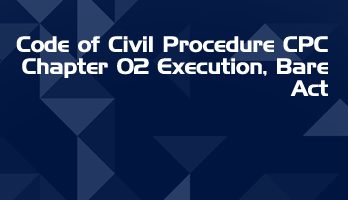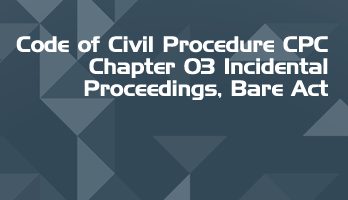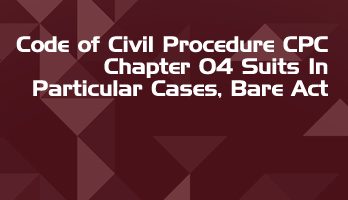A 'Bare act' is the actual legislation passed by the Parliament of India. Generally, an act sets out the high level legal and policy principles applicable to the subject matter of the law.
Most acts are accompanied by 'subsidiary legislation' such as rules, regulations, notifications and orders; which address the actual implementation detail of the act.
Free Full Course Available on LawMint's YouTube Channel
How to Land Your Dream LLB Internship in a Top Law Firm
- Part 1 - Introduction
- Part 2 - Internship Planning
- Part 3 - Internship Research
- Part 4 - Building Your Profile
- Part 5 - The Email
- Part 6 - The Resume
- Part 7 - The Cover Letter
- Part 8 - The Interview
- Part 9 - Self Development
Practical and comprehensive course, with real examples and step-by-step analysis of the complete internship application process. Check out LawMint's YouTube channel now!
Code of Criminal Procedure, 1973
Chapter 21 – Summary Trials
Section 260 – Power to try summarily
- Notwithstanding anything contained in this Code –
- any Chief Judicial Magistrate;
- any Metropolitan Magistrate;
- any Magistrate of the first class specially empowered in this behalf by the High Court, may, if he thinks fit, try in a summary way all or any of the following offences –
- offences not punishable with death, imprisonment for life or imprisonment for a term exceeding two years;
- theft, under section 379, section 380 or section 381 of the Indian Penal Code (45 of 1860), where the value of the property stolen does not exceed two hundred rupees;
- receiving or retaining stolen property, under section 411 of the Indian Penal Code (45 of 1860), where the value of the property does not exceed two hundred rupees;
- assisting in the concealment or disposal of stolen property, under section 414 of the Indian Penal Code (45 of 1860) where the value of such property does not exceed two hundred rupees;
- offences under sections 454 and 456 of the Indian Penal Code (45 of 1860);
- insult with intent to provoke a breach of the peace, under section 504 and criminal intimidation punishable with imprisonment for a term which may extend to two years, or with fine, or with both, under section 506 of the Indian Penal Code (45 of 1860);
- abetment of any of the foregoing offences;
- an attempt to commit any of the foregoing offences, when such attempt is an offence;
- any offence constituted by an act in respect of which a complaint may be made under section 20 of the Cattle – Trespass Act, 1871 (1 of 1871).
- When, in the course of a summary trial it appears to the Magistrate that the nature of the case is such that it is undesirable to try it summarily, the Magistrate shall recall any witnesses who may have been examined and proceed to re – hear, the case in the manner provided by this Code.
Section 261 – Summary trial by Magistrate of the second class
The High Court may confer on any Magistrate invested with the powers of a Magistrate of the second class power to try summarily any offence which is punishable only with fine or with imprisonment for a term not exceeding six months with or without fine, and any abetment of or attempt to commit any such offence.
Section 262 – Procedure for summary trials
- In trial under this Chapter, the procedure specified in this Code for the trial of summons – case shall be followed except as hereinafter mentioned.
- No sentence of imprisonment for a term exceeding three months shall be passed in the case of any conviction under this Chapter.
Section 263 – Record in summary trials
In every case tried summarily, the Magistrate shall enter, in such form as the Stale Government may direct, the following particulars, namely –
- the serial number of the case;
- the date of the commission of the offence;
- the date of the report of complaint;
- the name of the complainant (if any);
- the name, parentage and residence of the accused;
- the offence complained of and the offence (if any) proved, and in cases coming under clause (ii), clause (iii) or clause (iv) of Sub – Section (1) of section 260, the value of the property in respect of which the offence has been committed;
- the plea of the accused and his examination (if any);
- the finding;
- the sentence or other final order;
- the date on which proceedings terminated.
Section 264 – Judgment in cases tried summarily
In every case tried summarily in which the accused does not plead guilty, the Magistrate shall record the substance of the evidence and a judgment containing a brief statement of the reasons for the finding.
Section 265 – Language of record and judgment
- Every such record and judgment shall be written in the language of the Court.
- The High Court may authorise any Magistrate empowered to try offences summarily to prepare the aforesaid record or judgment or both by means of an officer appointed in this behalf by the Chief Judicial Magistrate, and the record or judgment so prepared shall be signed by such Magistrate.
Important Central Acts in Regional Languages
Legislative department website also features regional language versions of several important Central Acts.
Free Full Course Available on LawMint's YouTube Channel
How to Land Your Dream LLB Internship in a Top Law Firm
- Part 1 - Introduction
- Part 2 - Internship Planning
- Part 3 - Internship Research
- Part 4 - Building Your Profile
- Part 5 - The Email
- Part 6 - The Resume
- Part 7 - The Cover Letter
- Part 8 - The Interview
- Part 9 - Self Development
Practical and comprehensive course, with real examples and step-by-step analysis of the complete internship application process. Check out LawMint's YouTube channel now!












